
Tell us what you need to find a matching loft conversion specialist

Get free quotes from professionals near you

Compare offers and choose the one that best matches your need
- Householdquotes.co.uk
- Driveway
- Driveway Materials
- Cobblestone Driveways
Your Guide to Cobblestone Driveways (Pros and Cons)

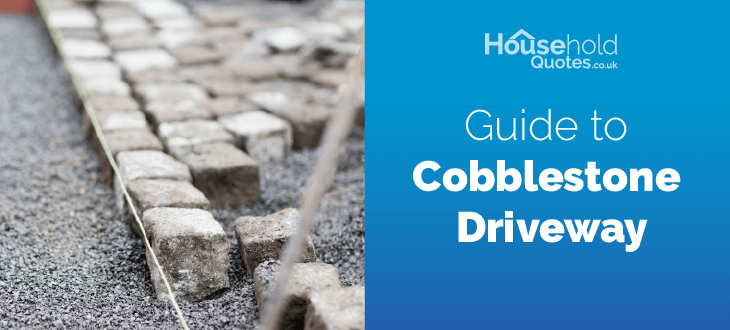
- The cost of cobblestones can vary from £20 to £70 per m2, depending on the stone type you choose.
- A cobblestone driveway can increase the value of your home by 2 to 10%, depending on the design, size, and location.
- Regular maintenance of your cobbled driveway can protect it from damage and ensure it lasts up to 60 years.
Cobblestone driveways provide a historical and rustic charm to any home. However, their appeal goes beyond aesthetics.
Created by the Romans in 250 BC, some cobbled streets in Europe laid in the 3rd and 4th centuries are still used by people and cars. Their strength, durability, and longevity make them one of the most classic and sought-after materials.
While other types of driveways, such as tarmac, provide a sleek, uniform surface, cobblestones present a timeless charm that not only enhances the visual appeal of a property but also boasts a range of practical benefits.
In this guide, we delve into the enduring appeal of cobblestone driveways, highlighting their historical significance, durability, eco-friendliness, and some of the drawbacks you must be mindful of. As we explore the virtues of cobblestone driveways, it becomes evident that they stand as a testament to the marriage of tradition and innovation in residential design.
However, even when you have decided that a cobblestone driveway is the perfect fit for your home, you are still presented with the challenge of looking for a driveway installer. It can be overwhelming and time-consuming and lead to pointless, unfulfilling quotes that do not fit your budget or specific needs.
Here at Household Quotes, we will remove unnecessary stress for you. By filling out our quick 30-second form below, we can provide four free quotes from local driveway specialists tailored to your needs.
- Describe your needs
- Get free quotes
- Choose the best offer
It only takes 30 seconds

What is a cobbled driveway?
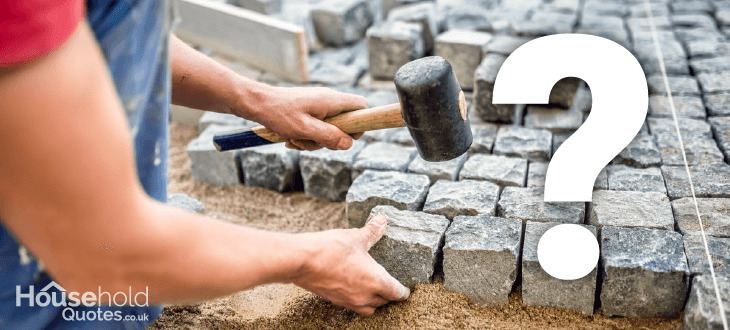
A cobbled driveway is created using small granite, basalt, or limestone stones, but other natural stones can also be used. These stones have a distinctive rounded appearance, formed through erosion by river water, resulting in unique colours and shapes for each cobble. This creates a versatile driveway tailored to your preferences.
Unlike other driveway materials that are often quarried, cobblestones are created by a natural process, making them an eco-friendly alternative.
Once gathered, they are carefully laid out in a pattern to create a durable and visually appealing surface. The stones are typically set in a bed of sand or mortar, providing stability and allowing for proper drainage.
Cobble driveways have a long history, dating back to ancient times. The Romans were the first to use cobblestones for their roads according to Historical Bricks; some are still in use today. With regular maintenance, a cobblestone driveway has an average lifespan of 50 to 60 years.
Advantages of a cobblestone driveway
Cobblestone driveways are popular for homeowners looking for timeless elegance and durability. They are known for their aesthetic appeal and practical functionality, making them a sought-after option. This driveway type offers various advantages, including natural beauty and resilience in different weather conditions.
These benefits make them a wise investment for any property owner. In this section, we will look at these advantages to understand why cobblestone driveways remain a top choice for homeowners in the UK.
-
- Durable: Cobblestones are known for their exceptional durability. They can withstand heavy use and resist cracking, chipping, and wear, making them suitable for high-traffic areas like driveways.
- Long lifespan: Cobblestone driveways can last up to 60 years, according to True Grid Pavers, due to the rugged natural stones and their interlocking pattern, which distributes weight evenly. Opting for them can help avoid the long-term costs of replacing damaged stone.
- Easy to replace: Cobbled stones are laid individually, so they can be replaced independently without affecting the entire driveway, making them a cost-effective choice in the long run. Additionally, damaged cobbles can be reused in other construction projects.
- Enhances curb appeal: New driveways can increase your home’s value between 2-10%, according to John Minnis Estate Agents. By creating an attractive entranceway using cobblestones, you can add value to your property.
- Versatile: Cobblestone driveways come in various shapes, sizes, and colours, allowing endless design possibilities. Whether you prefer a uniform look or a more intricate pattern, cobblestones can be arranged to suit your style and complement your home’s architectural features.
- Porous: Cobbled driveways allow rainwater to penetrate through, thanks to the porous stone and wide gaps, ensuring excellent drainage.
- Weather resistant: The open joints in your cobblestone driveway allow for proper water drainage, preventing the stone from being affected by a freeze-thaw cycle and avoiding cracking.
- Heat resistant: Cobblestones retain less heat than other driveway types, such as asphalt or tarmac, due to the porous stone and the gaps providing better air circulation. This results in a cooler and more comfortable driveway during hotter seasons.
- Low energy consumption: Cobbled driveways require manual labour rather than heavy machinery. Although manual labour increases costs, it reduces energy consumption, making your driveway more sustainable.
Cobblestone driveways offer a unique blend of historical charm, durability, and practicality along with an array of benefits that set them apart from other driveways. Whether you want to enhance the aesthetic appeal of your home or have a driveway that stands the test of time, cobblestone driveways are the perfect choice.
Disadvantages of cobbled driveways
While cobblestone driveways have many advantages, it's essential to consider the potential drawbacks before deciding. Despite their charm and durability, cobbled driveways may present some issues to you as a homeowner.
Below, we will explore some of the drawbacks associated with cobble driveways, shedding light on factors such as maintenance requirements, cost considerations, and potential issues related to uneven surfaces and limited traction. Understanding these disadvantages can help you decide whether a cobblestone driveway is right for your property.
- Cost: Cobblestones can be more expensive to install than other driveways. This is due to the labour-intensive nature of the installation process, as each stone needs to be carefully placed. The cost may vary depending on the type of stone selected, the driveway’s size, and the design’s complexity.
- Weed growth: If not properly maintained, the spaces between cobblestones can become weed-filled. Regular weeding and the use of weed barriers can prevent this issue.
- Snow and ice removal: Snow removal on cobbled driveways can be more challenging due to the uneven surface and gaps. Manual removal of ice and snow can be time-consuming and strenuous.
- Uneven surface: Uneven stones in cobblestone driveways can be difficult to walk on and pose a hazard to those with mobility issues.
- High maintenance: Due to their uneven surfaces, large gaps, and potential weed growth, cobblestone driveways require more maintenance than other types. The large gaps mean that you will have to manually remove debris and pull weeds, which can be laborious.
When considering this driveway type, weighing the pros and cons is essential to make an informed decision based on your specific needs and preferences.
Type of cobblestones for driveways
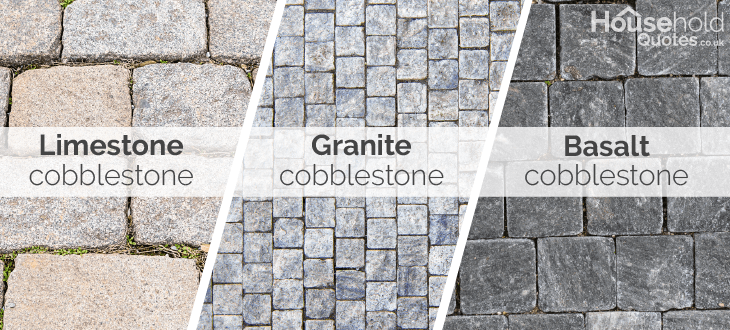
There are various cobblestone driveways to choose from, each with its distinct features. You can select the option that best fits your aesthetic preferences, budget, and maintenance needs.
- Granite: Granite is the most common type of cobbled driveway due to its strength, durability, and longevity. It is also easy to install, making it one of the more cost-effective options. Furthermore, it requires minimal maintenance, with the occasional power wash and sweeping being the only requirement. Granite cobbles come in various colours, such as red, black, green, and grey, and they come in different shapes that provide a unique and rustic charm to any home.
- Bluestone: Bluestone cobbled driveways are as solid and durable as granite and can last for decades. They are famous for their deep blue-grey colour and can create a distinctive driveway. It's important to note that bluestone driveways should never be power washed due to their colour, as this can strip away the colour.
- Porphyry: This cobblestone driveway originates from Italy and is highly resistant to frost, heat, and rapid temperature changes, making it a popular choice for those living in unpredictable climates. It comes in various colours: grey, brown, tan, rose, and warm purples.
- Belgian: Belgium is renowned for its cobblestones which create beautiful, long-lasting blocks. These stones are recognisable for their flatness, durability, and unique colours and tones, ranging from grey to black to pink.
Remember that when you have selected the type of driveway that suits your needs and preferences, you also have to consider the cobble's thickness. Having a block at least 30mm, according to Sareen Stone, will secure durability in your new driveway and allow it to withstand heavy traffic. While your new driveway cost will increase, it will save you money on repairs or replacements in the long run.
Cobblestone driveway cost
Cobblestone driveways cost is influenced by several factors. These include the choice of cobblestone materials, labour costs, and maintenance requirements.
It is crucial to understand these factors for a project that balances sophistication with financial responsibility.
| Influencing factors | Average cost |
|---|---|
| Cobblestone material | £20 to £70 per m2 |
| Labour | £150 to £200 per day |
| Skip Hire | £65 to £170 per day |
| Weed barrier installation | £40 per m2 |
| Driveway cleaning | £100 to £150 per day |
- Materials: Different types of cobble driveways will affect the overall cost. Hand-cut and locally sourced stones, like Belgian cobbles, will be more expensive than traditional granite. On the other hand, manufactured cobblestone driveways created using machinery will be more cost-effective if you are on a budget. These are mass-produced, making them readily available and easy to install.
- Labour: Cobbled driveways offer various design options through various laying patterns. However, more intricate designs will require additional time for installation by driveway specialists, leading to higher labour costs. Additionally, the size of the driveway will also impact the overall labour expenses.
- Skip hire: When creating a new driveway, a skip must be hired. The size of the skip needed depends on the amount of materials being used. A medium-sized skip is usually required for an average driveway of 30m2.
- Weed barrier installation:It is highly recommended that weed barriers be installed when laying a cobblestone driveway. This will prevent weed growth and save you from the hassle of pulling weeds from the gaps and joints in the future.
- Maintenance: Consider the long-term maintenance of cobblestone driveways. Although they are relatively low-maintenance, they require power washing, sweeping, and weed pulling to keep them looking fresh and prevent unnecessary damage. While you can do this yourself, it can often be strenuous. To avoid this, you can hire a driveway cleaner.
Understanding your new driveway cost is crucial.By carefully assessing the costs associated with different types of cobblestones, labour, maintenance, and additional features such as weed barriers, you can make an informed decision that fits your budget and desired outcome.
It's important to note that these costs are estimates. Each home and driveway are unique, so comparing at least four quotes from different driveway specialists is essential. This process can be time-consuming and frustrating.
By filling out our 30-second form, you can avoid the frustration of tirelessly searching for a local driveway specialist. We will provide four free quotes from local driveway installers tailored to your needs and preferences. Click below to find out more.
- Describe your needs
- Get free quotes
- Choose the best offer
It only takes 30 seconds

How to lay cobblestone driveway
Embarking on the journey of laying cobblestone is a venture that blends craftsmanship with practicality, resulting in enduring charm and timeless appeal. The art of laying cobblestones demands careful planning and precision.
When laying a cobblestone driveway, you will need to consider the pattern. Depending on your taste and budget, you can choose several patterns.
Here are the most common types of patterns used:
Offset staggered: Cobbles are arranged in a staggered pattern, creating a woven look for your driveway. This is the quickest and most cost-effective option for your new driveway.
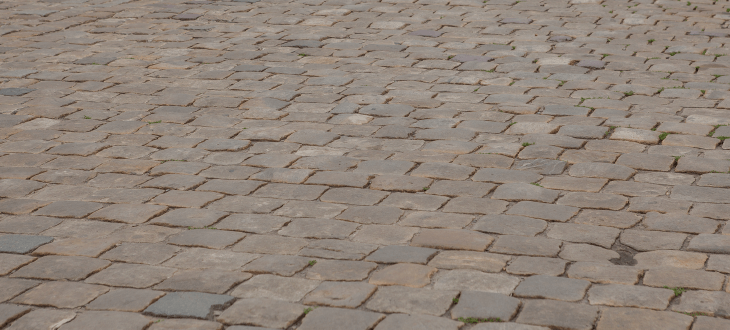
Overlapping arcs: This is one of the most popular patterns in cobbled driveways. It consists of overlapping and adjacent arcs, creating a robust, durable driveway capable of withstanding heavy traffic.
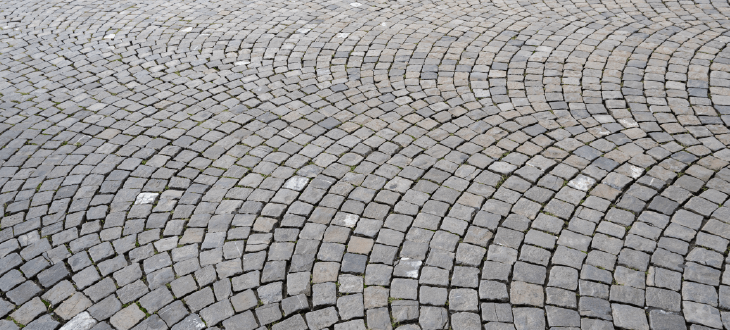
Peacock or fan: This design is one of the most intricate choices, resulting in a stunning driveway. Because of the complex pattern, it requires exact precision, which means more time is spent on installation, leading to higher overall costs.
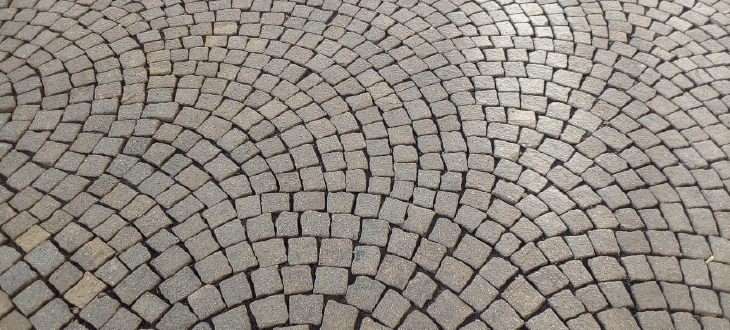
A cobblestone driveway will take 2 to 4 days to install. However, this is based on a small driveway with a simple offset staggered design. The more complex the design, the longer it will take to install your new driveway, resulting in a higher cost.
Once you've chosen your pattern, you must consider laying the edging. Edging enhances the aesthetics, preserves the driveway's structure, and prevents the cobblestones from shifting.
You can select from various edging materials, like brick, concrete, metal, or wood. Concrete edging is the most common type, as it is affordable and durable, with an average cost of £25 per metre. Metal edging is the most expensive, averaging £75 per metre, and although sturdy, it can rust over time.
Timber edging is the most cost-effective, priced at £6.50 per metre, according to Checkatrade. However, it is not recommended for heavily trafficked driveways as it is weaker and less durable than concrete, brick, or metal.
By considering the style and layout of your cobblestone driveway, you can estimate the costs and time involved, which is essential for budgeting.
How to maintain a cobblestone driveway
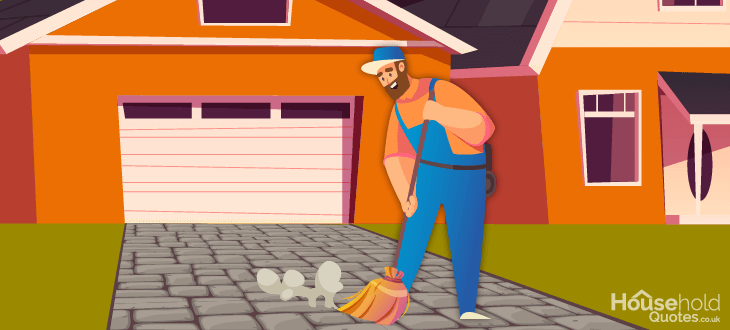
Maintaining a cobblestone driveway is essential for preserving its timeless charm, aesthetic appeal, longevity, and functionality. A well-maintained cobblestone driveway enhances the curb appeal of your property and contributes to safety and convenience.
While you can always hire a professional to clean your driveway, it is pretty straightforward to do it yourself, saving you some money. Here are the steps to maintain your cobblestone driveway:
- Before washing down your cobblestone driveway, sweep away any dirt, leaves, and twigs with a broom.
- You will most likely encounter weed growth if a weed barrier has not been laid down. After you have swept away debris, start removing weeds from the joints of your cobblestones.
- Excess dirt will build up over time and can only be removed by washing your driveway. A power washer is the most efficient way to remove embedded dirt and stains from your cobblestone driveway. If you don't have access to a power washer, the next best option is to use a degreaser or detergent to remove stains. Remember that this option may require excessive scrubbing to lift the stains.
- Resealing your cobblestone driveway every 3 to 5 years can help protect it from fading, stains, and damage.
It's generally recommended to clean your cobblestone driveway at least once a year to prevent grime buildup. However, you can choose to wash it more frequently if needed. Ultimately, the decision is up to you. Neglecting maintenance can lead to a shorter lifespan, reduced curb appeal, and potential repair needs.
Now that you have learned everything you need about cobblestone driveways, your next step is getting quotes from multiple contractors. You can gain valuable insights into your area's costs, materials, and services by getting multiple quotes. This process will help you make informed decisions that align with your budget, preferences, and quality standards.
However, doing this alone can be frustrating as it can be time-consuming, with varying information, inconsistent pricing, and uncertainty about the quality of work the contractor will provide.
We will help you avoid all these unnecessary issues by providing four free quotes. By filling out our 30-second form, we can gather all the necessary information and provide quotes from local qualified driveway specialists with your preferences in mind.
- Describe your needs
- Get free quotes
- Choose the best offer
It only takes 30 seconds

FAQ
Cobblestone driveways consist of individual stones with large gaps in between to allow rainwater to drain through. However, this can create an uneven surface, making it difficult to move across. Another disadvantage of cobblestone driveways is that the gaps can make it challenging to clean, as debris, ice, and snow need to be removed manually.
Moreover, without a weed barrier, weeds can grow and affect the structure of the driveway, adding to the maintenance required.
Cobblestones make an excellent choice for a driveway due to their durability, lifespan of up to 60 years, ease of repair and replacement, and ability to increase your property’s curb appeal and value.
On average, cobblestone driveways can last up to 60 years with regular upkeep.
The average cost of a cobblestone driveway is between £20 to £70 per m2 for materials only. The price will increase if you opt for high-quality stone. Furthermore, the installation cost for a cobblestone driveway is between £150 to £200 per day.

Caoimhe is an experienced content writer and researcher who is passionate about providing accessible information to every reader. With a background in English literature and Sociology, she combines the two disciplines to create cohesive, well-thought-out, and well-informed pieces.
